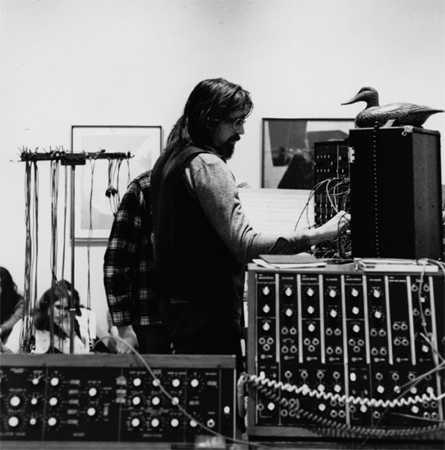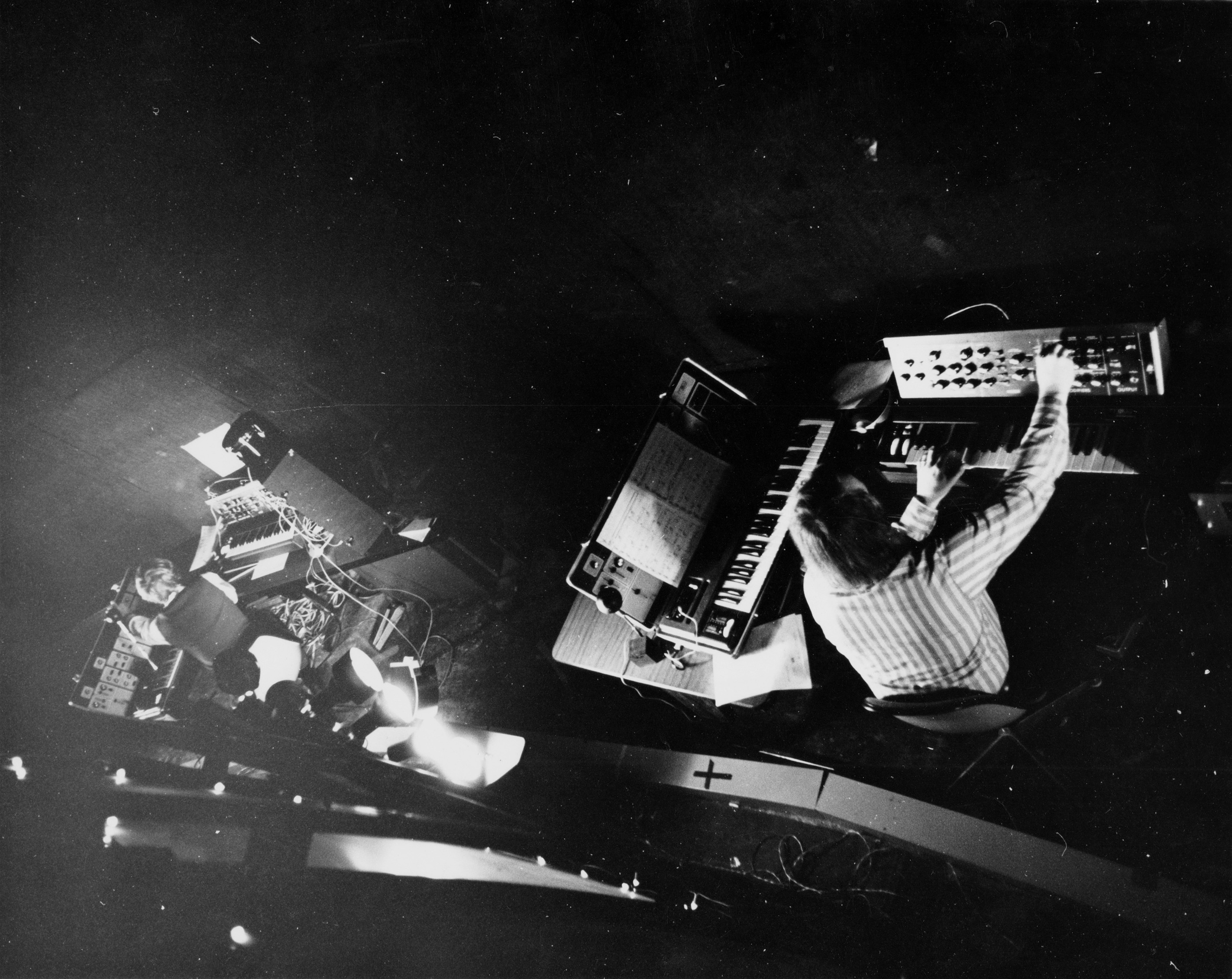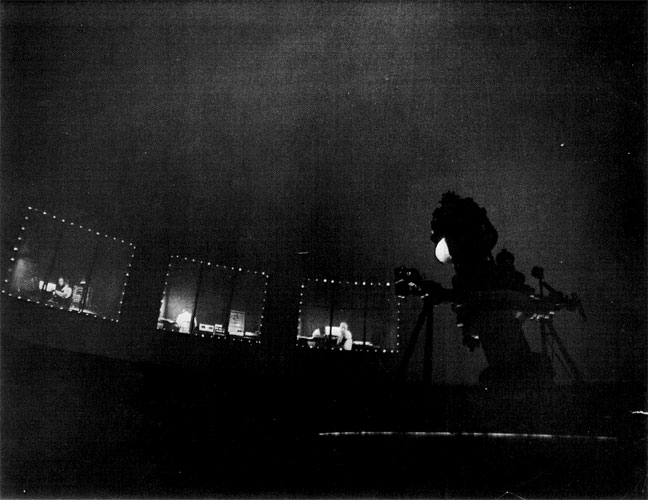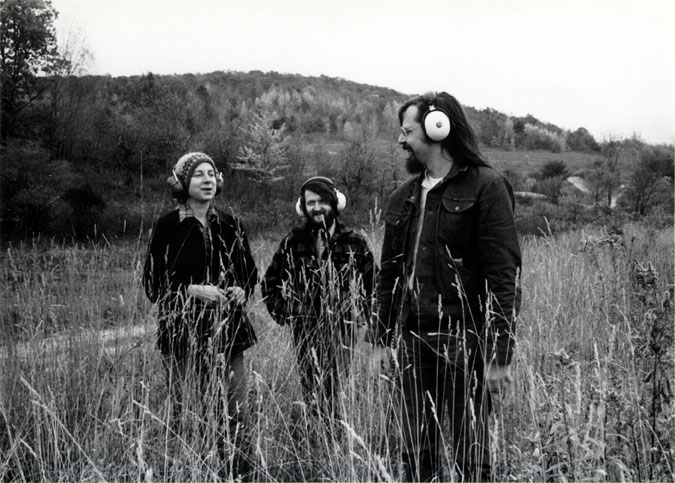On Easter 2020,
Cuneiform Records celebrates the 50th Anniversary of
"EASTER,"
a landmark work in the
history of electronic music and in
contemporary classical & minimalist composition,
created by
Ithaca NY based
composer/ keyboardist/ electronic music pioneer
David Borden,
with a stream
of his 1970 recording of "Easter"
on Cuneiform
|
|
Composed by David Borden over Easter weekend 1970 in Bob Moog's Workshop,
"Easter"
heralds the Dawn of the Electronic Music Age, marking the debut of compositions created for, and works performed on, the legendary MiniMoog.

On an auspicious Easter weekend 50 years ago in upstate New York, composer David Borden created a piece of music that became a landmark in the history of electronic music and live electronic performance, as well as in contemporary classical composition. Ensconcing himself in Bob Moog's Trumansburg NY studio, he began writing on Saturday, March 28th 1970, and worked throughout the night, completing his multi-layered, tonal pulse piece at 4am on Easter morning, March 29th. Borden (born on Christmas Day, 1938) named his new creation "Easter." It was the first work he had composed specifically for the Moog synthesizer. And soon, he'd perform it with his band, Mother Mallard's Portable Masterpiece Company, the world's first synth ensemble, in a landmark event.
Two weeks later, "Easter" was used in the world's first live Minimoog performance; a milestone in the history of electronic music. On April 10 and 11, 1970, Borden and his fellow Mother Mallard Portable Masterpiece Co. member Steve Drews performed "Easter" for a contemporary dance concert in Willard Straight Hall's Straight Theater at Cornell University. Borden used a Minimoog A; this was the world's first performance using a Minimoog A in a live concert. Moreover, Mother Mallard's April 1970 concerts at Cornell marked the first-time that ANY portable synthesizer was ever used for a live concert.
"Easter," performed either by Borden's Mother Mallard band or by Moog himself and others in his studio, quickly became the preferred work to be used for other live performance premieres spotlighting the Minimoog. Mother Mallard's Portable Masterpiece Co. performed it on numerous occasions. On June 30, 1970, they performed "Easter" using Moog's prototype Minimoog A in New York City's Trinity Church. The concert was another landmark in electronic music history: the NYC debut of the MiniMoog, and "Easter's" NYC premiere. The following year, Mother Mallard performed "Easter" at Cornell University's Sage Chapel on Easter Sunday 1971.
|
|

|
|
Concert program for the April 1970 NYC debut of 'The Moog Synthesizer' and David Borden's "Easter," performed by Mother Mallard's Portable Masterpiece Company.
Concert program courtesy of Tom Rhea, author of Minimoog Owner's Manual.
|
|
|
"Easter" Became the Centerpiece of the World's First Live Concerts Featuring Portable Synthesizers & MiniMoog
Capable of performed with a limited number of musicians on analog equipment, "Easter" proved to be an ideal piece for showcasing the Minimoog's capabilities in live performances. On Bob Moog's request, Borden wrote out his original instructions by hand so that Moog could play "Easter" live at a Planetarium concert. At a series of subsequent concerts at Strasenburgh Planetarium, Moog, Tom Lamb and Tom Rhea performed "Easter" along with some other works.

Photo depicting Bob Moog and Tom Rhea performing "Easter" at the Strasenburgh Planetarium concerts.
Courtesy of Tom Rhea.
Rhea told Cuneiform that: "Bob and Tom and I played live for several performances over several nights, and the Planetarium staff concocted a "space travel" narration complete with the mighty Zeiss rising from the center of the room, and multiple slide projectors blazing away . . . we were behind the near-spherical "shell" that comprises the screen for the images, and occasionally they would turn lights on "backstage" so we could be seen playing (through the screen) . . . it was all live as I recall. I don't think we had any tape going . . As I recall, we got through every performance without any major hitch."

Photo depicting Bob Moog, Tom Lamb and Tom Rhea performing "Easter" at the Strasenburgh Planetarium concerts.
Courtesy of Tom Rhea.
"Easter" has been performed a number of times during the 21st Century by David Borden and his Mother Mallard Ensemble in various manifestations over the years, as well as by other musicians. Ithaca NY, where Borden is based, has been the site of numerous "Easter" performances.
Cuneiform is providing this stream of "Easter" to celebrate the 50th anniversary of Borden's work, and to provide a bright spot on Easter 2020, a holiday overshadowed by the corona virus crisis and necessary social distancing. Cuneiform's "Easter" is recorded by the world's first all-synthesizer ensemble: Mother Mallard’s Portable Masterpiece Co., founded by David Borden and Steve Drews.
We encourage you to purchase this and other recordings by David Borden and Mother Mallard's Portable Masterpiece Company released on Cuneiform Records. They are available for sale in digital and CD formats via WaysideMusic.com, Bandcamp, at various online retailers, including Amazon.com.
|
|
Cuneiform Records Press Release for 1970-73:
When Robert Moog, inventor of the voltage controlled electronic synthesizer, introduced David Borden to his newest creation, the groundbreaking experimentation and creative performances that followed would echo throughout music history for decades to come.
Formed in 1969 in Ithaca, Mother Mallard's Portable Masterpiece Co. was one of the few to begin experimentation with such equipment, earning them a place in history within an exclusive group of pioneers such as Terry Riley, Philip Glass, and Tangerine Dream. Critically acclaimed as a group whose work was ahead of their time, the ensemble would set groundwork for the experimental classical minimalists and live synth-ensembles of the future. Over the years, the group expanded its instrumentation to include acoustic and other electric instrumentation alongside the Moogs. After Apple released its iconic personal desktop computers in the 1980s, Mother Mallard adopted that new digital technology as eagerly into its live performances as it had adopted analogue MiniMoogs. Today, Mother Mallard performs using Apple laptops to produce their distinct sound, but still pays tribute to their roots by featuring a Moog Voyager, Dr. Moog's last synthesizer design.
 David Borden is one of the foremost exponents of live electronic and minimalist music. He has been active on the new music and contemporary classical scenes for two decades. He first came to attention as the driving force behind Mother Mallard, the world's first all synthesizer ensemble. He would later go on to write for multiple vocal ensembles as well as film scores for several movies. With degrees from both the Eastman School of Music and Harvard University, David Borden would combine his extensive music knowledge with the then cutting-edge technology of the MiniMoog synthesizer to create a new sound, and an unforgettable album.
David Borden is one of the foremost exponents of live electronic and minimalist music. He has been active on the new music and contemporary classical scenes for two decades. He first came to attention as the driving force behind Mother Mallard, the world's first all synthesizer ensemble. He would later go on to write for multiple vocal ensembles as well as film scores for several movies. With degrees from both the Eastman School of Music and Harvard University, David Borden would combine his extensive music knowledge with the then cutting-edge technology of the MiniMoog synthesizer to create a new sound, and an unforgettable album.
 1970-1973 collects the first album by Mother Mallard's Portable Masterpiece Co. and previously unreleased recordings. MMPMC were the very first performing synthesizer ensemble, working closely with Robert Moog, whose first factory was nearby. This material pre-dates or is contemporary with the first contributions to the genre and had been forgotten until now.
1970-1973 collects the first album by Mother Mallard's Portable Masterpiece Co. and previously unreleased recordings. MMPMC were the very first performing synthesizer ensemble, working closely with Robert Moog, whose first factory was nearby. This material pre-dates or is contemporary with the first contributions to the genre and had been forgotten until now.
|
|
|
|
DAVID BORDEN/ MOTHER MALLARD'S PORTABLE MASTERPIECE CO.
RECORDINGS ON CUNEIFORM RECORDS
Cuneiform Records has released six albums by David Borden and Mother Mallard, including:
two archival albums (1970-73, and Like a Duck to Water) that include the earliest recordings by Mother Mallard's Portable Masterpiece Company; three discs containing the complete Continuing Story of Counterpoint, Borden's masterwork of minimalism (which critics have praised as "the Goldberg Variations of minimalism");
and a volume of Borden's more atmospheric compositions, called Places, Times and People.
For more information on Borden's releases on Cuneiform, please see:
http://www.cuneiformrecords.com/bandshtml/borden.html
|
|
|
DAVID BORDEN
(born December 25, 1938)

|
|
|
 DAVID BORDEN SOCIAL ONLINE:
DAVID BORDEN SOCIAL ONLINE: |
|
CUNEIFORM RECORDS
visit us on the web, at:
|
|
|
Cuneiform Records is one of the world's most longstanding independent record labels, internationally respected for its high-quality releases of avant garde music in a wide variety of genres - from jazz to rock to electronic to post-classical to Rock in Opposition and beyond - especially in creative music that defies, re-defines and/or transcends existing musical genres, blazing future paths. Based in the Washington DC area (downtown Silver Spring, MD) since 1984, it has released more than 450 critically acclaimed albums to date. Its releases have been critically acclaimed worldwide, and have appeared over the years in Best-Albums-of-the-Year lists in such publications as The Wall Street Journal, New York Times, Popmatters, The Quietus, DownBeat, Jazz Wise, The Wire, and more. Its music has been featured worldwide on radio ranging from college and community stations to national radio(NPR, BBC, RAI, NRK). In addition, Cuneiform Records has been honored over the years by inclusion in a number of year-end lists for Best Record Label, sometimes under jazz and sometimes under rock/progressive rock. Widely recognized for releasing innovative recordings by some of the world's most acclaimed jazz artists, Cuneiform is also recognized for its extensive collection of Rock in Opposition-related and other genre hybrids. Cuneiform's artists include long-established avant garde icons in addition to young rising stars. After taking a sabbatical for music of 2017, the adventurous and ever-evolving label reemerged in a streamlined, sustainable form, best suited for releasing recorded music in the digital age.
For more information about Cuneiform Records, the talented artists that it represents, and the numerous adventurous music recordings it's released over three decades, please visit Cuneiform Records' website and the Cuneiform Records You Tube Channel. We invite you to follow Cuneiform on our various social media sites. And most important, we invite you to sign up for our Cuneiform Records' Newsletter.
|
|
|
|
|

No comments:
Post a Comment